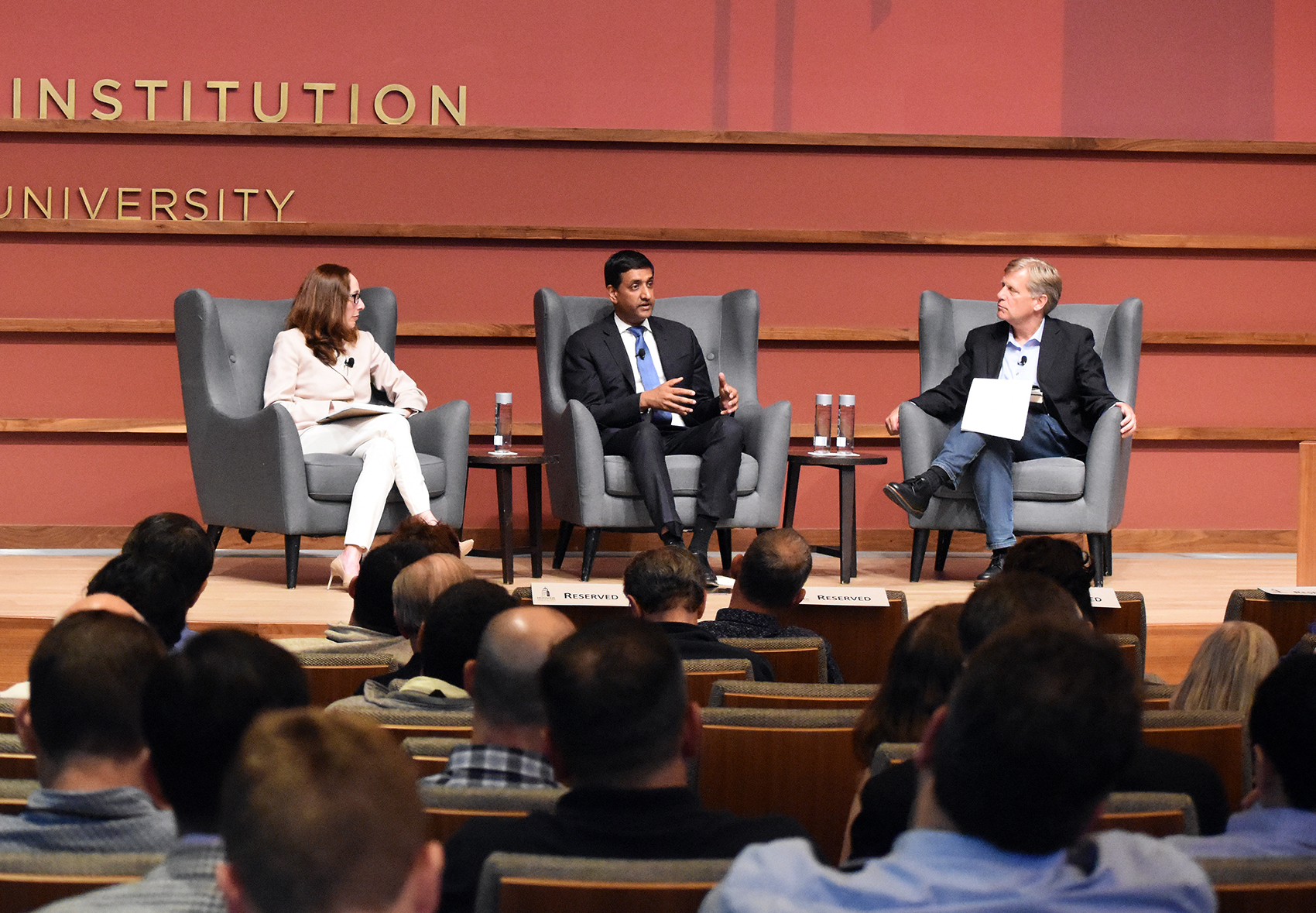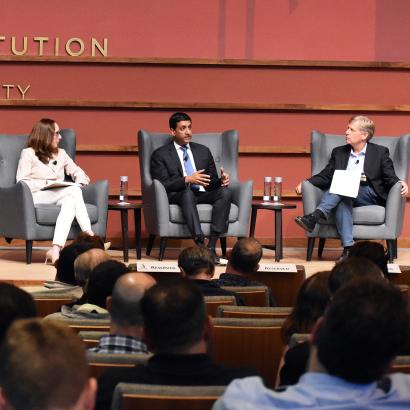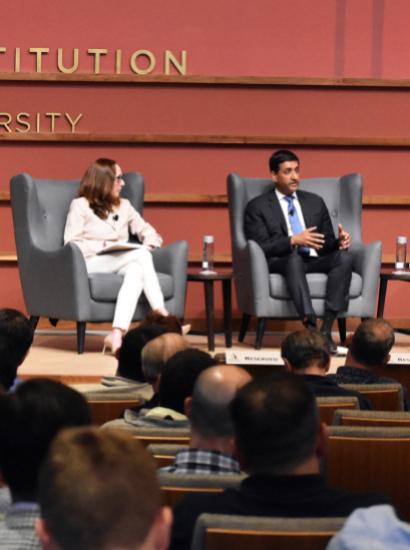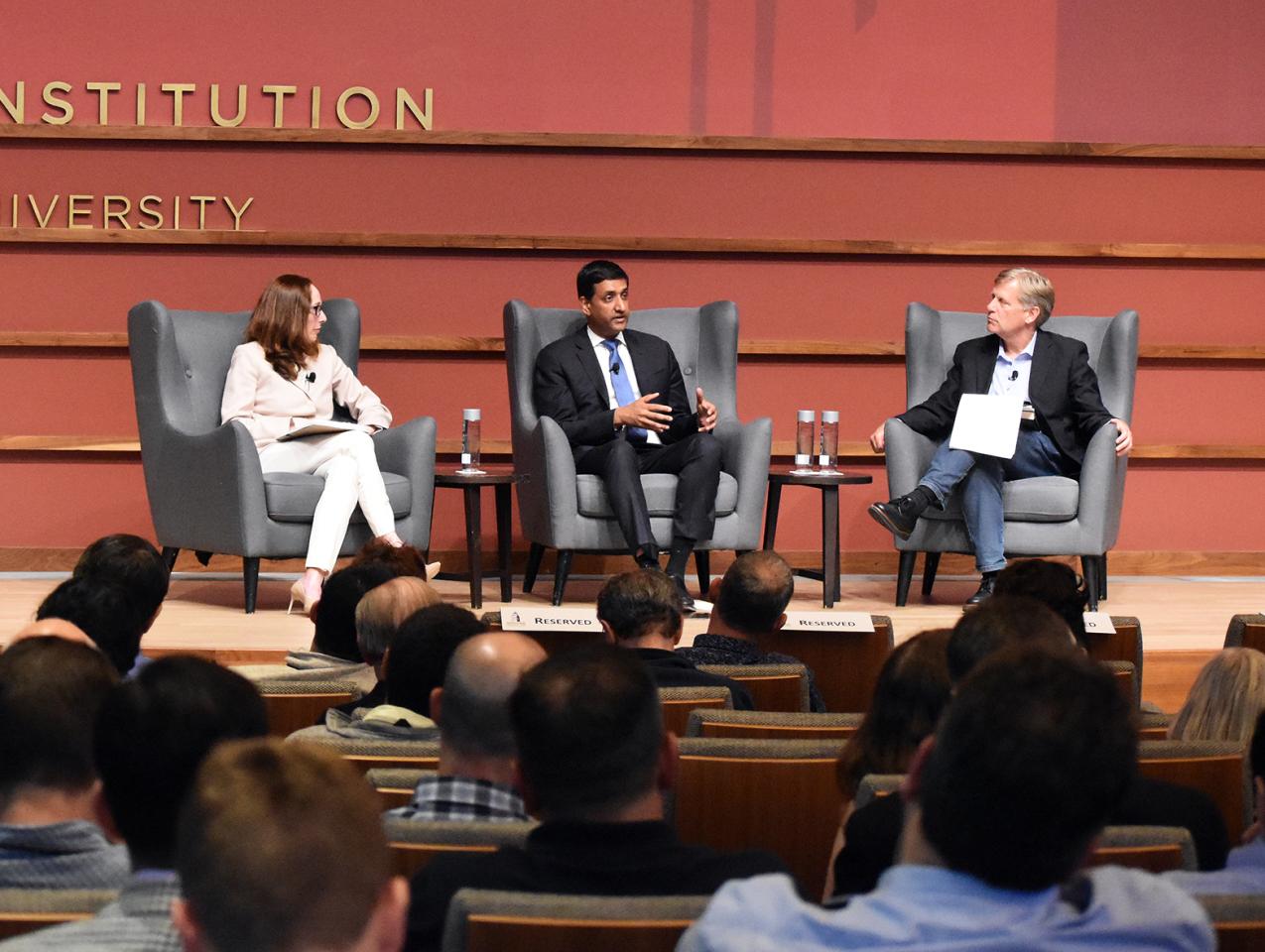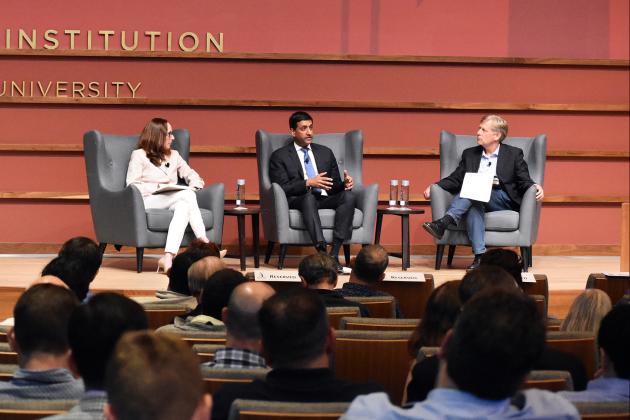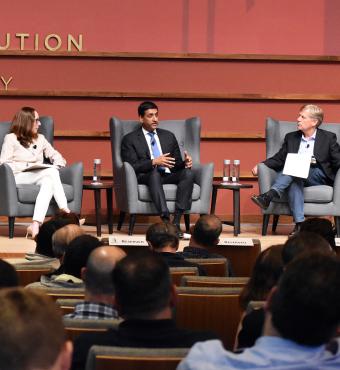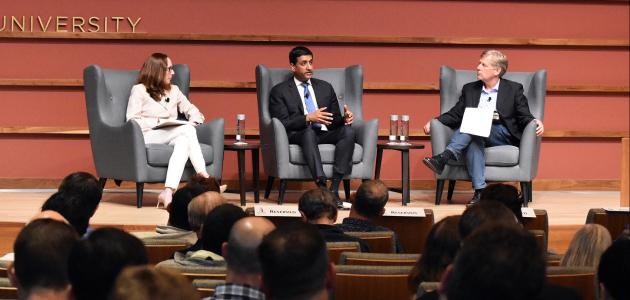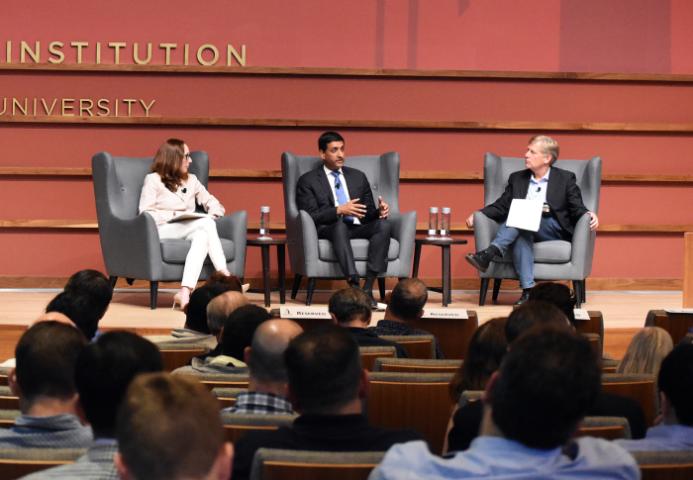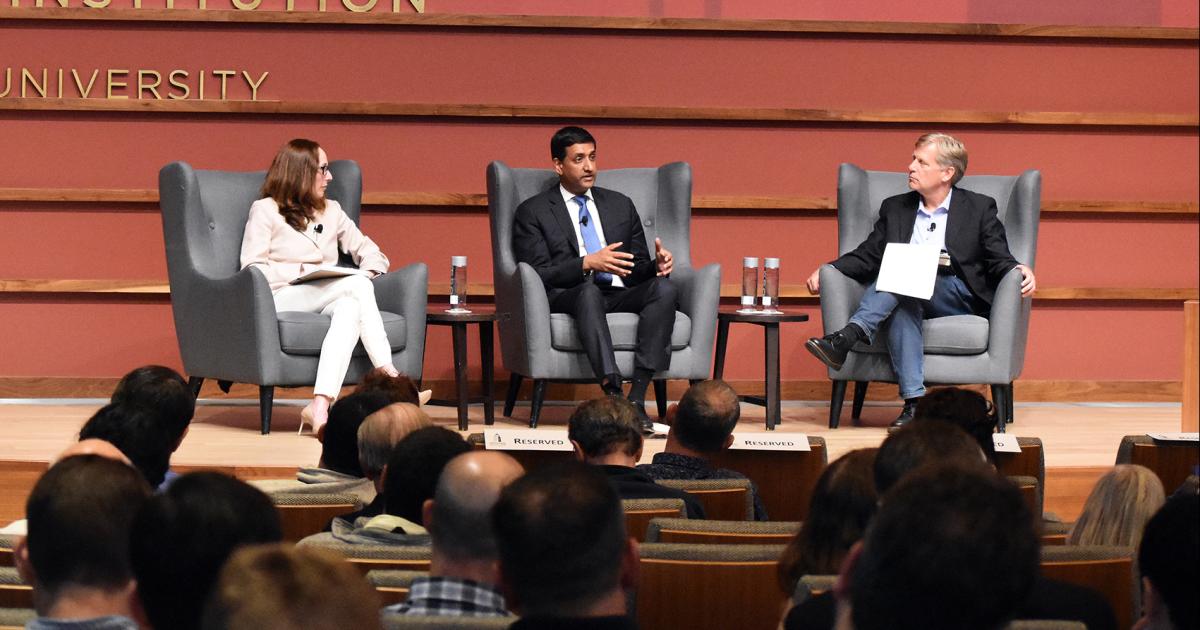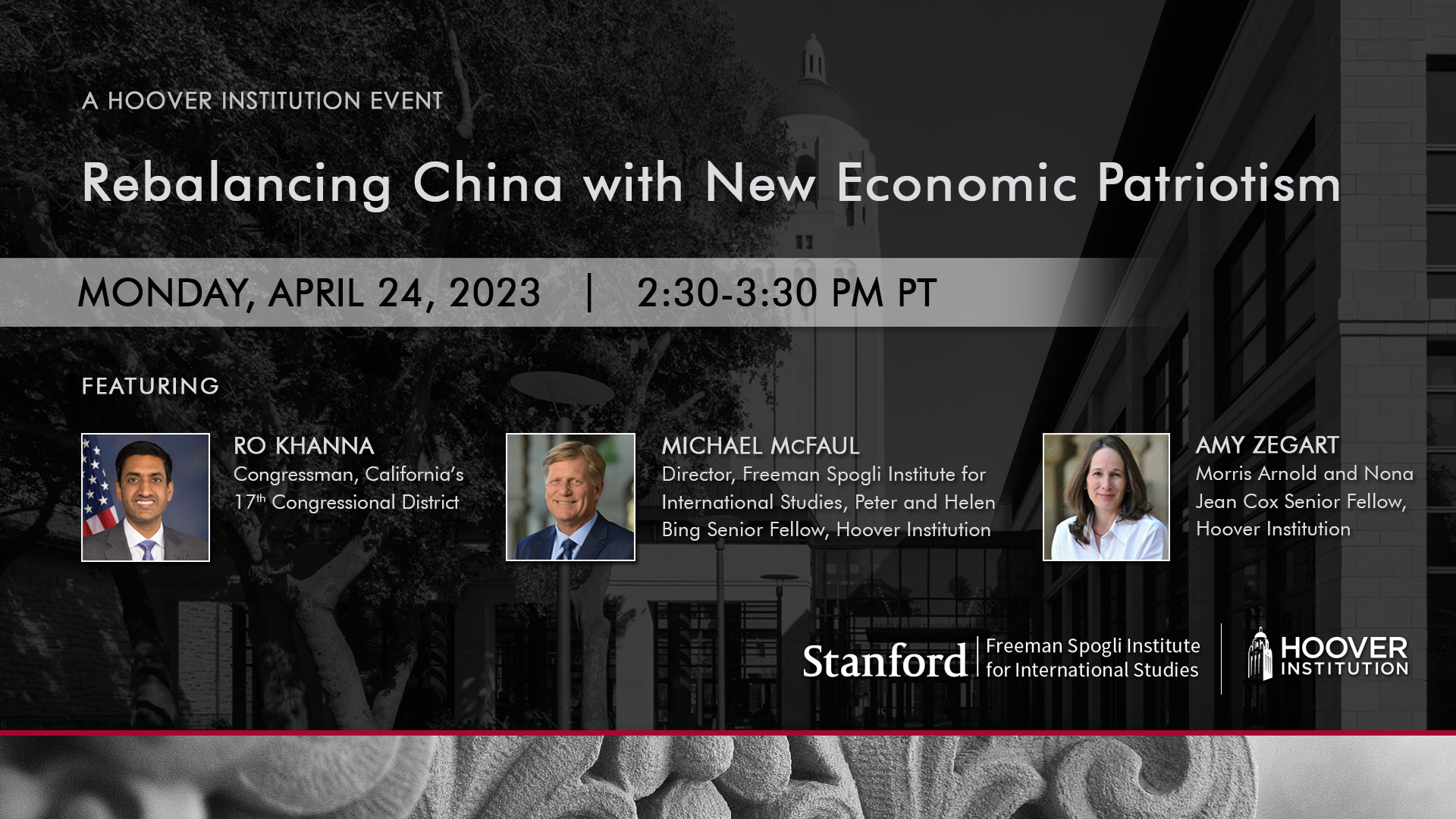Hoover Institution (Stanford, CA) – Ro Khanna, US Congressman representing Silicon Valley, addressed an audience of students and other members of the Stanford community about his vision for achieving level and fair competition with China, reducing tensions in Sino-American relations, deterring People’s Liberation Army (PLA) aggression against Taiwan, and rebuilding America’s manufacturing base.
The program was hosted in partnership between the Hoover Institution and Stanford’s Freeman Spogli Institute. After his remarks, Khanna engaged in a conversation with Amy Zegart and Michael McFaul, senior fellows in both sponsoring Institutions.
In Khanna’s perspective, the dominant narrative about US-China competition being a new Cold War clouds prospects of achieving a just and enduring peace. To achieve and sustain that ideal in the current global landscape, Khanna is advocating for a constructive rebalancing with China.
Khanna’s strategy is built on four guiding principles:
- An economic reset to reduce trade deficits and tensions between the United States and China
- Open lines of communication between policy and business leaders on both sides of the Sino-American relationship
- Effective deterrence for the US military and its security partners, especially Taiwan
- Respect for Asian partners based on mutual interests
Economic Reset
Khanna argued that the economic opening of China and unfettered globalization had unintended economic, social, and political consequences for America since the turn of the century. Over the past two decades, 70,000 American factories were closed, and millions of jobs were shipped to China. In parts of America, China’s rapid economic rise at the expense of American industry contributed to the destabilization of families, the rise of lethal drug use, and a polarized political landscape.
Moreover, Khanna explained, America’s manufacturing deficiencies were exposed by the COVID-19 pandemic when consumers were confronted with shortages of masks, medications, and other products they needed during that national emergency.
In his remarks, Khanna advocated for reducing America’s trade deficit with China. He said rebalancing trade requires providing federal financing for critical factories and making substantial investments in key industries including aluminum, steel, paper, microelectronics, advanced auto parts, and climate technologies.
In closing the trade deficit, Khanna also argued that the United States should prevent Chinese officials from manipulating exchange rates in their favor; impose countervailing duties and tariffs on Chinese goods; urge China to buy more US products like pork, soybeans, and corn; and renegotiate World Trade Organization rules so that the WTO can punish China if it violates principles of free trade and basic human rights.
Khanna asserted that fixing this trade imbalance will benefit the US economy and will also reduce Sino-American tensions.
“When we reduce trade deficits, when we bring jobs home, we reduce the anger and vitriol dominating the China conversation. That can help pave the way for less inflamed rhetoric,” Khanna said.
Open Lines of Communication
Khanna argued that maintaining lines of communication between the United States and China is critical to easing tension on both sides, avoiding the risk of war, and deescalating a conflict, should it occur, in the Taiwan Straits. Strong norms, he said, should be established around government-to-government and military-to-military communications lines. Business leaders, he maintained, can project a form of soft power through relationships and networks they have built in Chinese society. As an example, Khanna suggested that leaders like Bob Iger, who has visited China over 40 times as Walt Disney Company’s CEO, could serve as an intermediary in resolving specific policy challenges.
Khanna also suggested that Sino-American tensions can be eased and common ground can be sought through cooperation and meaningful action in areas of international concern such as climate change.
Building Effective Deterrence
Nevertheless, Khanna said, it would be naïve to be complacent about the threats that China imposes on its neighbors, notably Taiwan. He urged the United States and its allies to signal clearly to China about the high price it would pay if the PLA launched a cross-strait assault.
To build effective deterrence against a PLA invasion or blockade of Taiwan, Khanna called for delivering more munitions in the Pacific. He stressed the urgent need for submarines and ships that can destroy PLA vessels; advanced artificial intelligence to conduct surveillance and reconnaissance; and asymmetric capabilities such as drones, naval sea mines, and high mobility artillery rocket systems that can repel a large-scale Chinese assault.
Khanna said that establishing deterrence for Taiwan against China, while sustaining support for Ukraine in its fight with Russia, will require America to invoke the Defense Production Act and expand the number of weapons suppliers beyond America’s five big defense contractors.
America’s anemic manufacturing base is itself a national security threat, Khanna argued.
“We won World War II by having twice the output of Germany and Japan,” Khanna explained. “During the Cold War, we had contingency plans to mobilize manufacturing hubs like Detroit, but now our industrial base went offshore.”
Respect for Asian Partners
Khanna emphasized that in providing support for Taiwan, the United States must consider the preferences of the Taiwanese people. Despite their tensions with the Chinese Communist Party, Taiwanese receive enormous economic benefits from trade with the mainland. He said that while it is vital that the United States help strengthen Taiwan’s defenses, provocative actions must be avoided. To help maintain this delicate peace, Khanna advocated that the United States also reaffirm a commitment to a One China Policy and the status quo in cross-strait relations.
Khanna also said that the United States should build security and economic partnerships with India and other Asian partners based on mutual interests. Strengthening these like-minded actors and, in turn, encouraging multipolarity in Asia, he said, will help prevent China from posturing itself as the region’s hegemon.
Achieving Bipartisan Support to Rebuild American Manufacturing
In his conversation with Zegart and McFaul, Khanna said that he is hopeful that the United States can muster the resolve on a bipartisan basis to rebuild its manufacturing base to tackle twenty-first-century challenges. As an example, he pointed to America’s response to the COVID-19 pandemic, which, despite political dysfunction, resulted in the rapid development and delivery of vaccines and economic assistance to millions of Americans.
“We know we can do it when there is a crisis. What I am arguing is that the lack of a manufacturing base is a crisis,” Khanna said, adding, “I am not saying we could have bipartisan solutions to all the issues or on many of the issues. But in this crisis, I think that there is possibility.”







